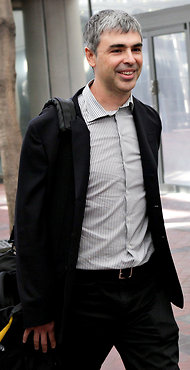SAN FRANCISCO — Larry Page, Google’s chief executive and co-founder, celebrated the first anniversary of the announcement that he would take over the company with the news Thursday that it had exceeded $10 billion in quarterly revenue for the first time.

But there were no Champagne toasts for Mr. Page. Wall Street had expected Google to do better, and shares dropped 9 percent in after-hours trading.
Google’s net revenue and earnings, though strong, failed to meet analysts’ expectations. Financial results were hurt by unfavorable foreign exchange rates, increased spending by Google, changes the company made to ad formats and the sale of more mobile ads, which cost less.
Those factors added to analysts’ longer-term concerns that 2012 could be a difficult year for Google as it navigates antitrust investigations, intellectual property litigation over Android, competition from Facebook and the acquisition of Motorola Mobility, the struggling handset maker.
“Google seems to be outperforming online advertising as a whole, which is pretty amazing,” said Jordan Rohan, an analyst at Stifel Nicolaus.
Still, he said, “Google has big-company problems now, or more specifically, huge-company problems.”
Mr. Page insisted that there was nothing disappointing about Google’s performance.
“I’m very happy with our results,” he said on a conference call with analysts. “Google had a very strong fourth quarter.”
He added, “2012 promises to be a fantastic year.”
Google, based in Mountain View, Calif., reported that net income in the fourth quarter rose 6.4 percent, to $2.71 billion, or $8.22 a share, from $2.54 billion, or $7.81 a share, in the period a year earlier. Excluding the cost of stock options and the related tax benefits, Google’s fourth-quarter profit was $9.50 a share, up from $8.75 a year ago. Analysts had expected $10.49 a share.
The company said revenue climbed 25 percent, to $10.58 billion, from $8.44 billion.
Net revenue, which excludes commissions paid to advertising partners, was $8.13 billion, up from $6.37 billion. Analysts had expected net revenue of $8.4 billion.
Google’s disappointing results were particularly surprising because it rarely misses analysts’ expectations and because the fourth quarter is usually its strongest, fueled by retail ads for online holiday shopping. Indeed, e-commerce advertising on Google was strong during the holidays, mobile advertising increased significantly and display advertising with image and video is on track to generate $5 billion in revenue for Google in the coming year, said Nikesh Arora, Google’s chief business officer.
Still, said Colin Gillis, an analyst at BGC Partners, “Q4 is Google’s time to shine, and it was just O.K. results, so Google looks a bit mortal.”
Analysts focused on the amount that advertisers pay for clicks on Google ads, a metric called cost-per-click, which dropped 8 percent over both last quarter and last year. Susan Wojcicki, Google’s senior vice president of advertising, told analysts that a drop in average cost-per-click often accompanied an increase in the number of paid clicks on ads, which rose 34 percent over last year. She also said that foreign exchange rates and 40 changes that Google made to ad formats in the second half of last year affected cost-per-click. It was also affected by an increase in ads on cellphones, which sell for a 20 to 50 percent discount, according to Goldman Sachs.
At one point, Mr. Page half-joked to analysts that he would prefer questions about something other than the cost-per-click on ads. He seemed much more eager to talk about the company’s social network, Google Plus, which he said had 90 million users. He also said 60 percent of them used it daily and 80 percent weekly. But advertisers and analysts are not yet convinced that Google Plus will become popular enough to compete with Facebook and Twitter.
“The engagement levels on Google Plus are pathetic compared to the larger platforms on social media,” Mr. Rohan said. “Most would discount what they say as an overly optimistic view.”
Last week, Google incorporated posts, photos and conversations on Google Plus into search results, causing a controversy over privacy and whether it favors its own social network over others.
“Generally, companies have been walling that data off, and we’d love to use more of it,” Mr. Page said on the call.
Analysts also said they were concerned about Google’s acquisition of Motorola Mobility. Though it has not yet been approved by regulators, they say absorbing the handset maker would be a punch in the gut to Google’s operating margins. On Jan. 6, Motorola announced disappointing fourth-quarter earnings, telling Wall Street that device sales were down and that its financial results missed analysts’ expectations.
Google executives did not talk at length about Motorola, but Mr. Page said the company would break out its financial results separately so investors could track its performance.
Also weighing on Google’s quarterly results: operating expenses, which climbed 35 percent, to $3.38 billion in the fourth quarter, in part because of Google’s aggressive hiring and increased spending on advertising.
“If you ask me to sum up Larry Page’s tenure as C.E.O., it’s one thing: downward margins,” Mr. Gillis said.



